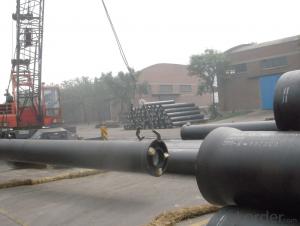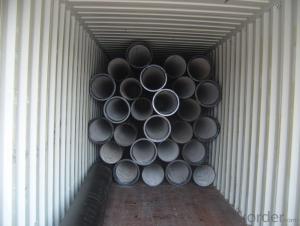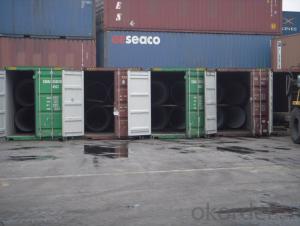DUCTILE IRON PIPES K8 DN350
- Loading Port:
- China Main Port
- Payment Terms:
- TT OR LC
- Min Order Qty:
- -
- Supply Capability:
- -
OKorder Service Pledge
OKorder Financial Service
You Might Also Like
Ductile Iron Cast Pipe is without any defects compare with tradition casting tech, which has many advantages particularly as follow:
(1) High density. In the "vertical upward casting" process, the melt iron of centre liquid column in center crystallizer is continuously feeding for volume shrinkage caused by condensation tube at outer circumference , which lead to be free of shrinkage porosity.
(2) High purity. When melt iron pouring, the mixed impurities such as gas, dross, sand grain which are lighter than melt iron could be eliminated at furnace mouth, its impossible to enter into the crystallizer through the channel, so the melt iron into the crystallizer is very pure.
(3) Strength with toughness. The cooling speed provided by continuous crystallizer is 30 times than sand casting and 5 times than centrifugal casting, and doesn't produce white iron, the eutectic cell volume of continuous cast iron is one eighth to one tenth compare with traditional cast iron. The density of graphite nodule in ductile iron can reach 300-700 pcs/mm2. Therefore, all reason above improve the strength and toughness of continuous cast iron.
(4) Free machining. The high speed cooling make the hardening phase (such as boride, steadite) not appear like reticular, massive or thick, but diffuse like fish bone and pane in shape, moreover, there are tiny graphite flakes inlaid hardening phase. It's free machining in BrinellHardness the range of 250-300HB. However, the Brinell Hardness of 250 is top limit to common metal materials.
(5) Uniform composition of tube wall. The convection mixing of liquid column caused by marching type drawing in crystallizer make the composition of tube wall well-distributed, and concentration gradient very little.
(6) High productivity. To the wall thickness of tube under 10mm, the speed of continuous casting is 1 meter/min, to the wall thickness of tube under 20mm, the speed of continuous casting is 0.5 meter/min, which is high efficiency that centrifugal or other casting tech couldn't reach.
- Q:Are ductile iron pipes resistant to microbiologically induced corrosion?
- Yes, ductile iron pipes are generally resistant to microbiologically induced corrosion (MIC). Ductile iron is a type of cast iron that has been treated with magnesium to give it increased strength and flexibility. This treatment creates a protective layer on the surface of the iron, making it less susceptible to corrosion caused by microorganisms. MIC occurs when certain types of bacteria, fungi, or other microorganisms interact with the metal surface of pipes and produce corrosive byproducts. However, ductile iron is generally resistant to MIC because the protective layer formed during the manufacturing process acts as a barrier, preventing microorganisms from directly contacting the metal surface. Additionally, ductile iron pipes are often lined with cement mortar or other protective coatings, which further enhance their resistance to corrosion. These linings provide an additional layer of protection against microorganisms, reducing the potential for MIC. Despite these inherent resistance properties, it is important to note that the resistance to MIC can vary depending on the specific conditions and environment in which the pipes are installed. Factors such as water quality, temperature, and the presence of certain microorganisms can influence the susceptibility of ductile iron pipes to MIC. Therefore, it is essential to consider these factors and take appropriate measures to prevent MIC, such as regular monitoring of water quality, proper maintenance, and the use of corrosion inhibitors or biocides when necessary.
- Q:Can ductile iron pipe be used for industrial wastewater applications?
- Yes, ductile iron pipe can be used for industrial wastewater applications. Ductile iron pipe is known for its strength, durability, and resistance to corrosion, making it suitable for various applications including wastewater systems. It can handle high-pressure and heavy-duty environments, making it ideal for industrial wastewater applications that may involve abrasive or corrosive substances. Additionally, ductile iron pipe can be easily installed and maintained, reducing the overall costs and ensuring long-term reliability. However, it is important to consider the specific requirements of the wastewater application and consult with professionals to determine the most suitable pipe material and design.
- Q:DN1800 can the length of ductile iron pipes be several meters? What is the total weight?
- Ductile iron pipe is a kind of cast iron pipe.
- Q:Are ductile iron pipes suitable for use in cooling water systems?
- Yes, ductile iron pipes are suitable for use in cooling water systems. They offer excellent strength, durability, and corrosion resistance, making them ideal for transporting water at varying temperatures. Additionally, their flexibility allows them to withstand pressure and temperature changes, ensuring long-lasting and reliable performance in cooling water applications.
- Q:How does ductile iron pipe handle thermal expansion and contraction?
- Ductile iron pipe is able to handle thermal expansion and contraction effectively due to its inherent flexibility and strength. Its unique composition allows it to withstand the expansion and contraction caused by temperature fluctuations without breaking or becoming brittle. This property is crucial in preventing any damage to the pipe or its fittings, ensuring a reliable and durable pipeline system.
- Q:Can ductile iron pipes be used in earthquake-prone areas?
- Yes, ductile iron pipes can be used in earthquake-prone areas. Ductile iron is a strong and flexible material that can withstand the ground movement and vibrations caused by earthquakes. It has excellent ductility, meaning it can deform without fracturing or breaking under stress. This property allows ductile iron pipes to absorb the energy generated during an earthquake, reducing the risk of pipe failure or rupture. Additionally, ductile iron pipes have been successfully used in seismic zones for many years, proving their resilience and reliability in such areas. However, it is important to note that proper installation and design considerations, such as using appropriate jointing methods and ensuring proper anchoring, are essential for ensuring the performance of ductile iron pipes in earthquake-prone areas.
- Q:What is the average weight of ductile iron pipe?
- The average weight of ductile iron pipe can vary depending on its size and thickness. Generally, ductile iron pipe ranges in weight from approximately 3.5 pounds per foot for smaller diameters to over 20 pounds per foot for larger diameters. It is important to note that these weights are approximate averages and can vary slightly based on specific manufacturers and pipe specifications.
- Q:What is the expected pressure class for ductile iron pipes?
- The pressure class anticipated for ductile iron pipes may differ based on the particular use and project needs. In a general sense, ductile iron pipes are engineered to manage high-pressure situations and are typically offered in pressure classes spanning from 150 psi to 350 psi. These pressure classes signify the utmost operational pressure that the pipe can endure while preserving its structural soundness. To ascertain the suitable pressure class for ductile iron pipes in a specific scenario, it is crucial to refer to industry standards, guidelines, and project specifications.
- Q:Can ductile iron pipes be used for underground water treatment systems?
- Yes, ductile iron pipes can be used for underground water treatment systems. Ductile iron pipes are known for their strength and durability, making them suitable for various applications, including underground water treatment systems. These pipes are resistant to corrosion, making them ideal for transporting water, even in harsh underground environments. Additionally, ductile iron pipes have a high load-bearing capacity, allowing them to withstand the pressure and weight of the soil above. They are also versatile and can be easily installed and maintained, making them a practical choice for underground water treatment systems.
- Q:Can the underground cast iron pipes be connected with clamps to form buttress?
- The hoop has the advantages of beautiful appearance, convenient operation, strong clamping force, good sealing performance, etc.. Mainly used for connecting and fastening vehicle, ship, diesel engine, gasoline engine, machine tools, fire, and other machinery and equipment, chemical equipment general nylon hose, plastic hose, hose cloth, water interface and seal etc..
1. Manufacturer Overview |
|
|---|---|
| Location | |
| Year Established | |
| Annual Output Value | |
| Main Markets | |
| Company Certifications | |
2. Manufacturer Certificates |
|
|---|---|
| a) Certification Name | |
| Range | |
| Reference | |
| Validity Period | |
3. Manufacturer Capability |
|
|---|---|
| a)Trade Capacity | |
| Nearest Port | |
| Export Percentage | |
| No.of Employees in Trade Department | |
| Language Spoken: | |
| b)Factory Information | |
| Factory Size: | |
| No. of Production Lines | |
| Contract Manufacturing | |
| Product Price Range | |
Send your message to us
DUCTILE IRON PIPES K8 DN350
- Loading Port:
- China Main Port
- Payment Terms:
- TT OR LC
- Min Order Qty:
- -
- Supply Capability:
- -
OKorder Service Pledge
OKorder Financial Service
Similar products
New products
Hot products
Related keywords



























